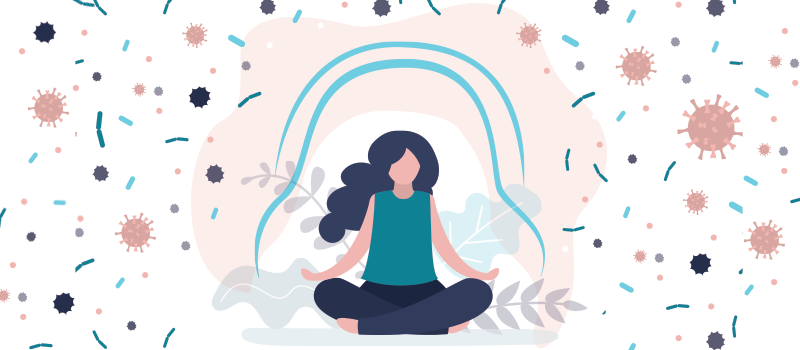What’s the Buzz
The Bee Healthy Blog
Health Experts’ Predictions for the 2022 Flu Season

Recent flu seasons over the past couple of years have been unpredictable due to the COVID-19 pandemic. Measures such as school closures, work from home, lockdowns, wearing masks, and social distancing have affected the seasonal flu, with fewer cases in general. However, now that life is pretty much back to normal in 2022, things might be different. So, what are public health experts predicting for the coming influenza season? Please keep reading to find out.
How did COVID affect the normal flu season?
Both COVID-19 and influenza are caused by rerespiratory viruses. These and other respiratory illnesses spread through small droplets from the nose and mouth. During the COVID-19 pandemic, the first year’s flu season (2020) was a minor one due to the measures undertaken to prevent coronavirus.
In 2021, things were a little different. When someone recovers from infectious diseases like the flu or COVID-19, they retain some natural immunity that protects them from future infections. The COVID mitigation measures in 2020, therefore, led to less natural immunity. As a result of this reduced population immunity, 2021 was a more severe flu season.
Are experts predicting a severe flu season in 2022?
Public health experts are not predicting an especially severe upcoming flu season in 2022. It is likely to be a normal season. In other words, the severity is likely to be similar to flu seasons prior to COVID. However, many factors can affect whether we have a more severe flu season.
Keep in mind that the number of flu cases and the severity of flu illness are affected by decisions made at a personal level. Influenza-associated hospitalizations can be more or less depending on whether people are wearing face masks, practicing social distancing, and vaccination rates for the flu virus.
How does COVID-19 compare to the flu?
Both influenza and COVID-19 are respiratory illnesses. The flu commonly causes symptoms like fever, headache, sneezing, coughing, muscle aches, and fatigue. COVID-19 also causes similar symptoms. However, in addition, COVID-19 can cause specific symptoms like anosmia and ageusia (lack of smell and taste, respectively) and and also recently it has been determined "long covid syndrome".
Some people have a stronger immune response and experience a mild illness, whether it's flu or coronavirus cases. Others may develop serious complications from these infections. It depends on a person’s level of immunity and vaccine uptake on an individual level and in the community.
The important thing to remember is that preventive measures work for the flu, COVID-19, and other respiratory viruses like the respiratory syncytial virus (RSV). These diseases are preventable with measures such as hand washing, ventilation of rooms, wearing face masks, and social distancing.
Can you get COVID-19 and the flu at the same time?
Yes, you can get COVID-19 and the flu at the same time. However, this is not very common. Some people are calling the COVID and flu combined illness “flurona.” This is a slang term, however. Healthcare professionals or the Centers for Disease Control and Prevention (CDC) are not using this term.
I got the flu vaccine last year. Do I need to get it again this year?
There are many different flu viruses, and they are constantly changing. The composition of the flu shots in the US is updated every year to match flu activity, i.e., to protect against currently circulating flu viruses. All flu vaccines are designed to protect against the four circulating viruses that research shows will be common during the coming flu season.
Health care providers recommend that everyone 6 months of age and older (with rare exceptions) should get influenza vaccines to prevent flu hospitalizations and serious illness.
Will the flu shot help fight the coronavirus?
A large study has suggested that the influenza vaccine may provide some protection against serious complications of COVID-19. However, public health experts and health care providers warn that the influenza vaccine is not a replacement for the COVID-19 vaccine.
Nonetheless, the study found that people who did not get the flu vaccine were more likely to be admitted to intensive care for COVID-19, more likely to go to the emergency department, and more likely to have a stroke, sepsis, and blood clots (deep vein thrombosis). There was no difference in the death rate between high and low influenza vaccination uptake groups, however.
Experts believe that an adjuvant flu vaccine dose boosts the body’s immune system and protects against all pathogens, including the coronavirus.
Should I get the flu vaccine and the COVID-19 vaccine at the same time?
You can get the flu vaccine and COVID-19 vaccine at the same time. But it’s a good idea to check with your health care provider before taking both vaccines.
If your doctor says it’s okay, you can get both vaccines at the same visit. You should follow the recommended schedule for both vaccines. If you are not yet fully vaccinated against COVID, go ahead and get your COVID-19 vaccine as soon as possible. You should get the flu vaccine before the end of October.
Children ages 5 years and older are eligible for COVID-19 vaccination. They, too, can get a COVID-19 vaccine and flu vaccine at the same visit. However, each of the vaccines will be given at a different injection site.
Should I get a flu vaccination if I have COVID?
No, you should postpone your flu vaccination if you have tested positive for COVID-19, whether or not you have symptoms. You can get the flu vaccine once you have completed isolation and are symptom-free. Mild illness is not usually a reason to defer flu vaccination. However, suspected or confirmed COVID cases are asked to postpone flu vaccination visits to avoid exposing healthcare personnel and other people to the COVID-19 virus.
References:












SOCIAL